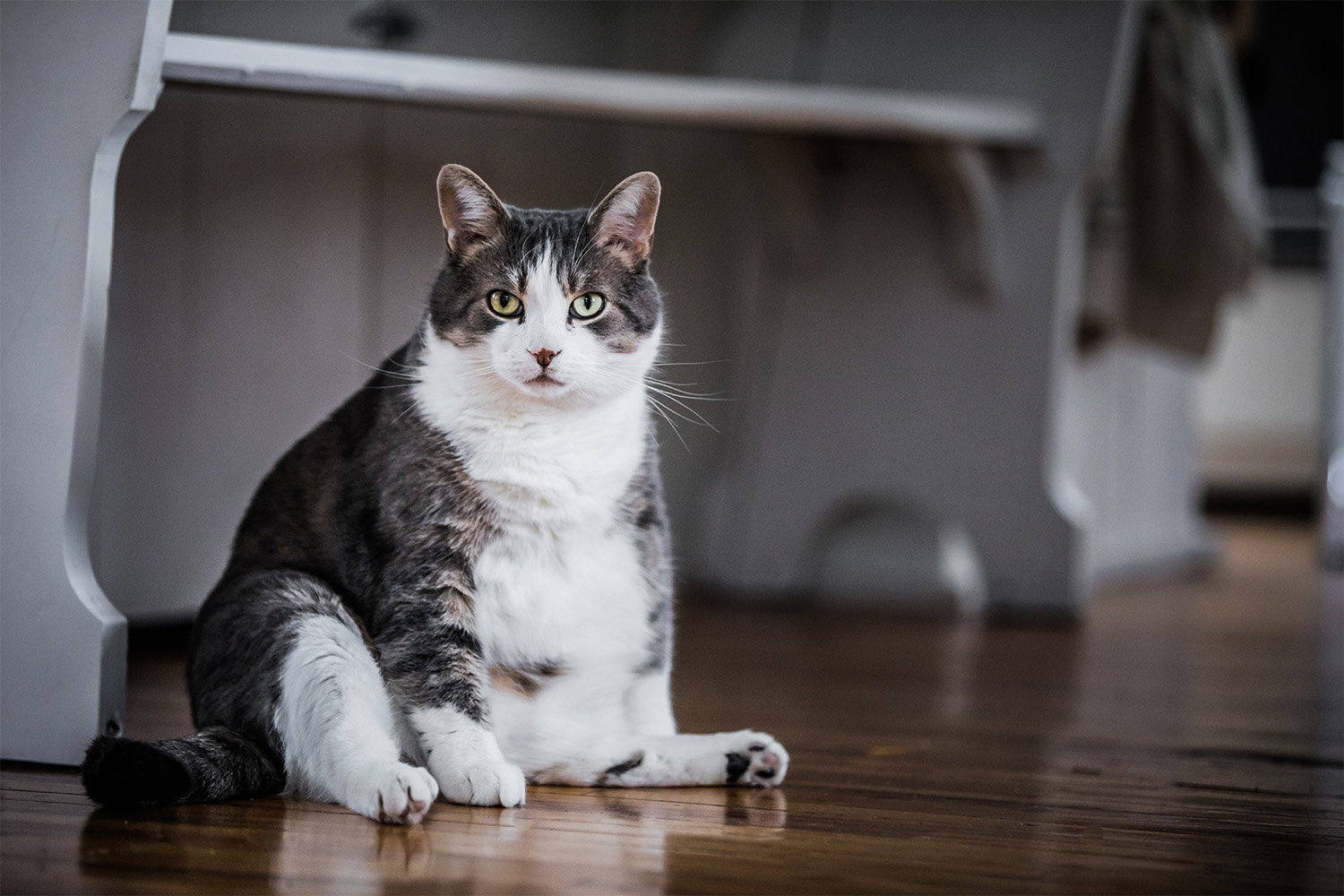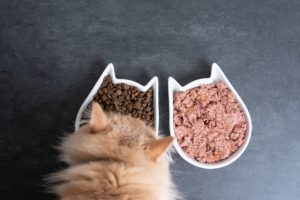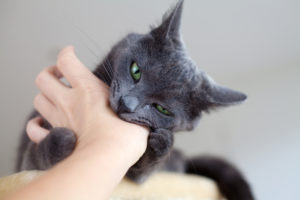All cats are different — they can weigh anywhere from six to 25 pounds, depending on their breed. There is a fine line between an overweight cat and a robust, chunky (but healthy) cat… but what if your cat is not fat but pregnant?
Of course, you know your cat best, so if there is a potential that the weight your cat has been gaining could be little kittens, you want to figure it out sooner than later.
There are signs that you can look out for to help you determine whether or not your cat is pregnant or just gaining weight. Regardless of what is happening, figuring it out early on can help you to prepare for either a bunch of adorable kittens or a new diet and exercise plan.
Why Is My Cat Gaining Weight?
A cat who is gaining unwanted weight could be experiencing a variety of conditions, including pregnancy, obesity, or even illness. Though this may be obvious, if you have a male cat that is gaining weight, it could be due to a number of conditions, including overeating or an underlying health condition.
In this case, consult with an AskVet veterinarian about what the cause may be.
Female cats who are gaining weight could also have an underlying health condition or lifestyle habits, but unspayed females also run the risk of becoming pregnant. If your cat was spayed and there’s no way she could be pregnant, keep an eye on what she does.
Is she active? Does she whine for a second breakfast? Maybe your cat is neither pregnant nor fat; perhaps what you’re seeing is the primordial pouch. These tidbits can be helpful clues when playing detective.
Signs of Pregnancy in Cats
Outdoor cats and unspayed cats that live with unneutered cats are more likely to become pregnant, but it can still happen if an indoor cat gets out one day and goes on an adventure.
If there is a possibility that your cat could become pregnant, there are signs that you can look out for. You will want to find out as soon as possible to prepare yourself for caring for a pregnant cat and the incoming kittens.
If you begin to notice changes in your cat’s behavior, appetite, or body, you might want to take note of them and consult with a veterinarian. A cat will begin showing signs of pregnancy two weeks into the process but are pregnant for around two months.
1. Your Cat Is in Heat
Even though we still view them as kittens, at four months, they can go into heat, which means they are capable of getting pregnant. While pregnancy is possible, it’s not recommended for cats at this age since their bodies are still growing.
If your cat is unspayed, they can go into heat for two or three cycles during the breeding season, which happens from February to October. Her behavior can change (sometimes only slightly) to signal that she’s in heat, such as becoming more affectionate, raising their behinds higher in the air as they walk, and being more vocal.
2. Physical Changes Pop Up
Rapid weight gain is a part of the symptoms of pregnancy in cats. This is because the process from fertilization to birth happens very quickly. A cat’s gestation period is nine short weeks (around 61 to 65 days), so your cat will take on significant weight in a short period.
What is really different from simply gaining weight is that the weight that is gained won’t be distributed evenly. If your cat is pregnant, all of the weight gained will be in the stomach and not the legs, neck, or face.
You may notice that their belly is swelling, and their nipples will likely be enlarged and very pink. This is called “pinking up,” and it happens as a response to being pregnant and preparing for milk.
3. Change in Eating Habits
Your cat might begin wanting more portions of food each day, and this could be a response to pregnancy. You don’t want to be overfeeding your cat, so confirming with a veterinarian that your cat is pregnant can avoid giving the wrong amount.
If your cat is pregnant, monitor their eating habits and ensure they receive enough nutrition. They will need more food as their pregnancy progresses, so feeding them a bit extra won’t likely hurt them.
It’s completely normal for a pregnant mama to want something more to nibble on, but keeping an eye on the weight gain and eating behaviors can determine how the pregnancy is going. A well-fed cat that gains a healthy amount of weight will have a healthier pregnancy than an underfed cat.
4. Morning Sickness
Cats, just like humans, can experience morning sickness — especially in the early stages of pregnancy. If a cat has become pregnant, they may vomit within the first three weeks before it usually settles down. However, not all cats experience this, though.
In the case of repeated vomiting, continue to monitor your cat. Your cat might not be pregnant and instead suffering from some sort of illness, so the sooner you get a diagnosis, the sooner your cat will feel better.
5. Behavior Seems Abnormal
A pregnant cat might experience some behavioral changes that are apparent to their human parent. To many, these changes might be imperceivable, but you, as their parent, you’re more likely to recognize something has changed.
For example, a feline mama-to-be might become a bit more territorial and cling to one specific person in the household. Very few become aggressive, but if a stranger startles them enough, it’s possible. Other cats become even more cuddly and affectionate, wanting you to spend all your time with them.
If your cat is experiencing behavior that worries you, you can ask an AskVet Pet Coach. They can help clue you into what’s happening with your pet before needing to schedule an office visit at your vet.
6. Exhibits Nesting Behaviors
Another change of behavior that often signals your cat is pregnant and preparing for babies is “nesting” behavior. This is when a cat will begin to create a space, often in a small corner tucked away, that will serve as the place she gives birth. She might bring blankets or pieces of clothing into this area to create a nest of some sort.
This is likely to occur as your cat nears the end of her pregnancy. Providing a box or safe area for your cat to do this can help to build trust with your cat. Still, don’t be surprised if your cat chooses a spot on their own away from everyone. Some cats prefer to be in isolation during the birthing process.
Or Is Your Cat Simply Fat?
Not all cats that gain weight are pregnant, and there are some signs to look out for to determine if your cat is becoming obese.
For the benefit of your cat’s health, help them maintain a healthy weight through diet and exercise. If they begin gaining weight, there is likely to be an underlying reason.
To determine if your cat is overweight, there are a few things you can take note of:
1. Body Condition Score (BCS)
Large cats are not uncommon, and actually, many cats that you come across are considered to be overweight. We all know the trope of a “lazy, fat cat.”
Though we love them dearly, sometimes the weight gained can create issues for their health. If you want to assess your cat’s body fat and muscle mass to determine if they are just a bit overweight, look into the Body Condition Score (BCS) systems.
This system can give you an idea of your cat’s size compared to the ideal weight. If your cat is nearing the end of the point system, it might be time to consult with one of AskVet’s Certified Pet Lifestyle Coaches™ about an eating and exercise regime.
2. Watch Their Eating Habits
If you think your cat is gaining too much weight, it might be time to watch how much they are consuming.
How many portions is your cat eating? How many treats are they getting in a day? How much exercise is your cat getting daily? Consider the home size — while you may not be giving your cat any snacks, a roommate or parent might.
Once you have a better idea of how much your cat consumes, you can figure out if that contributes to their weight gain. If they seem to be eating a regular amount and exercising but still gaining weight, underlying issues with their health could be at play.
Still Unsure? Phone a Friend.
A cat’s weight can fluctuate for the tiniest of reasons, including stress, change in environment, pregnancy, illness, and so on. It’s essential to understand exactly what the issue is so that we can provide the best care for our fluffy friends.
Some cats are lazier than other breeds and put on weight easier. This can be normal, but it’s still our responsibility to get them back on track. Fat cats often live very happy lives, but their health should always come first!
For pregnant cats, weight gain is simply a part of the process. Once the kittens are born, the proud mama will slowly start to return to her previous weight. If you notice changes in your cat’s behavior that concern you, you can sign up with AskVet to chat with a veterinarian whenever you need to.
Having 24/7 access to veterinary professionals dedicated to providing care for your pet can ease a lot of your stress. As you determine the cause of your cat’s weight gain, many questions and concerns might arise. Getting answers fast can lead you to make the best decisions for your cat in the most efficient amount of time. Whether your cat is pregnant or just a bit overweight, AskVet is here to guide you through it!
Sources:
Clinical Management Of Pregnancy In Cats | NCBI
Breeding And Reproduction Of Cats – Cat Owners | MSD Veterinary Manual
Body Condition Scoring (BCS) Systems | Journal Of The American Animal Hospital Association







